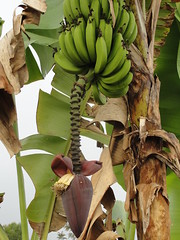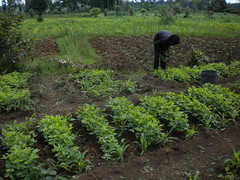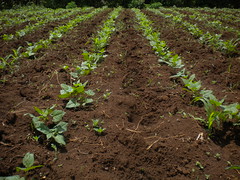 The New Year is right around the corner and I have come to the realization that my time here is limited: a very stressful thought. The longer I stay here in Kenya, the more I hate to leave this place, my projects, and the friends that I have made. Living in Dagoretti has been such a huge blessing, words cannot express my gratitude. On December 12th, a Dagoretti community event was held where food was collected for the less fortunate, football matches were held throughout the day, and the youth showcased their musical talents onstage. To the right is a picture of the event and some of the community members that attended.
The New Year is right around the corner and I have come to the realization that my time here is limited: a very stressful thought. The longer I stay here in Kenya, the more I hate to leave this place, my projects, and the friends that I have made. Living in Dagoretti has been such a huge blessing, words cannot express my gratitude. On December 12th, a Dagoretti community event was held where food was collected for the less fortunate, football matches were held throughout the day, and the youth showcased their musical talents onstage. To the right is a picture of the event and some of the community members that attended. My relationships with the street youth has continued to grow, and so has my knowledge about street life and the immense difficulties these youth face. The police are an ongoing source of stress for the youth. Most of the youth have experienced police brutality in some form or another. This ranges from bribes, threats, torture and even murder. I have seen these youth, street smart survivors, tearfully describing receiving police death threats. I have been told stories about friends who were dragged to the nearby forest and executed at the hands of the police. In fact, just before sitting down at my computer today, the police hauled the driver out of his matatu at Wanyee corner (where I live), and beat him in broad daylight. Below are some of the street youth after being brutalized by police. The youth are intelligent, creative, charismatic individuals and I can see their immense potential. Unfortunately, when you are hungry, tired, sick and cold, it is difficult to apply oneself to the fullest. How can this cycle be broken?
My relationships with the street youth has continued to grow, and so has my knowledge about street life and the immense difficulties these youth face. The police are an ongoing source of stress for the youth. Most of the youth have experienced police brutality in some form or another. This ranges from bribes, threats, torture and even murder. I have seen these youth, street smart survivors, tearfully describing receiving police death threats. I have been told stories about friends who were dragged to the nearby forest and executed at the hands of the police. In fact, just before sitting down at my computer today, the police hauled the driver out of his matatu at Wanyee corner (where I live), and beat him in broad daylight. Below are some of the street youth after being brutalized by police. The youth are intelligent, creative, charismatic individuals and I can see their immense potential. Unfortunately, when you are hungry, tired, sick and cold, it is difficult to apply oneself to the fullest. How can this cycle be broken? On a lighter note, I also got the opportunity to attend a community event over in Eastleigh. Eastleigh is a suburb of Nairobi predominantly inhabited by Somolians. My language tutor, Nancy Njeri, helped to organize an event for girls in Eastleigh called Ms Mrembo (beautiful in Swahili). The event featured girls football matches followed by a fashion show. During the fashion show girls modelled clothing, hair and make-up, and were asked a number of questions about women's inner beauty. It was a great day, and I made a lot of new friends.
In other news, there is no end to the amount of work and the ways to contribute to both Soweto Academy and Shiriki. I am constantly updating the website: www.haileselassiefoundation.com. Also the blog that we started on our Maragua agricultural initiative has been shortlisted in the youth in agriculture blog competition http://shirikiorganization.blogspot.com/ The winners receive 400,000 Ksh, money that would go a long way in assisting Shiriki's ongoing endeavors.
In addition, we recently submitted a project proposal to the Umande Trust fund. The Umande group has been working with grassroots NGOs located in Kibera. They have provided ongoing training and workshops for these NGOs and recently asked for project proposals for funding. As I have already mentioned, the Shiriki volunteers make a variety of arts for sale, which is the main source of funding for the NGO. We visited a very successful shoe making organization located in Eastleigh called Eco-sandals. They create sandals out of recycled materials, similar to Shiriki, and sell them both locally and internationally. They have acquired machinery to reduce labour time, and have actively reached out to fair trade eco-friendly retail outlets in the western world. They represent a model for which Shiriki is striving to achieve. To the right is a picture of Ras Ng'ang, a Shiriki volunteer, at Eco-sandals in Eastleigh.
As for Soweto Academy, things have also been moving along. I finalized the project proposal to apply for funding to obtain computers in their school. I have sent it out to two different foundations and though I have already received one rejection letter, I am going to keep trying! For the cost of implementing a computer curriculum in their school, it is a very worthwhile project. I am also continuing to research ways to help them obtain the much needed capital to get their water bottling company off the ground. I recently met with the Acumen Fund and talked about their business plan to verify whether Acumen would be an appropriate donor agency in which to submit a proposal. I am not sure if it is a direct fit, nonetheless, I obtained some very good information and suggestions which I have shared with the management over at Soweto.

 Last, but not least, my very good friend Theresa came to visit me during Christmas. We had a lot of fun together. We visited the coast, got to go snorkeling, saw dolphins (pictured above), and ate some delicious coastal food. We also spent a lot of time in Nairobi and I got the opportunity to show her a part of my world. She helped me with some of my projects and shared some of her own ideas for both Shiriki and Soweto Academy. Me and Theresa have been friends for over 18 years, and it was a real blessing to have her spend the holidays with me and meet some of the colorful characters I have come to know.
Last, but not least, my very good friend Theresa came to visit me during Christmas. We had a lot of fun together. We visited the coast, got to go snorkeling, saw dolphins (pictured above), and ate some delicious coastal food. We also spent a lot of time in Nairobi and I got the opportunity to show her a part of my world. She helped me with some of my projects and shared some of her own ideas for both Shiriki and Soweto Academy. Me and Theresa have been friends for over 18 years, and it was a real blessing to have her spend the holidays with me and meet some of the colorful characters I have come to know.






